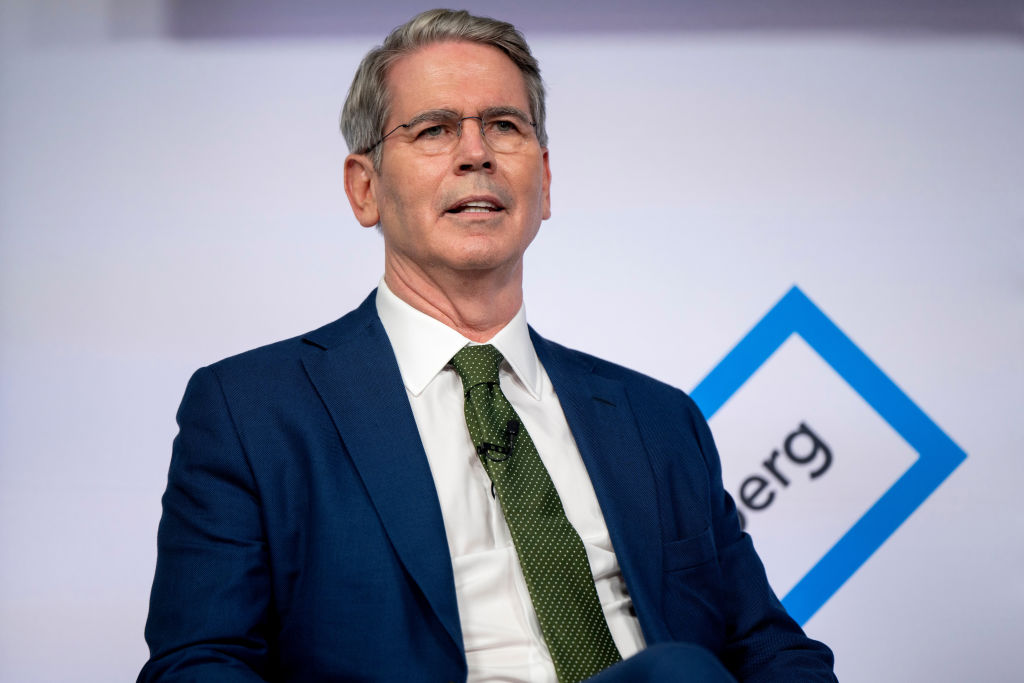How Women Approach Investing
Liz Ann Sonders, chief investment strategist at Charles Schwab, says women know who they are as investors -- for example, whether they’re aggressive or risk-averse.

Profit and prosper with the best of Kiplinger's advice on investing, taxes, retirement, personal finance and much more. Delivered daily. Enter your email in the box and click Sign Me Up.
You are now subscribed
Your newsletter sign-up was successful
Want to add more newsletters?

Delivered daily
Kiplinger Today
Profit and prosper with the best of Kiplinger's advice on investing, taxes, retirement, personal finance and much more delivered daily. Smart money moves start here.

Sent five days a week
Kiplinger A Step Ahead
Get practical help to make better financial decisions in your everyday life, from spending to savings on top deals.

Delivered daily
Kiplinger Closing Bell
Get today's biggest financial and investing headlines delivered to your inbox every day the U.S. stock market is open.

Sent twice a week
Kiplinger Adviser Intel
Financial pros across the country share best practices and fresh tactics to preserve and grow your wealth.

Delivered weekly
Kiplinger Tax Tips
Trim your federal and state tax bills with practical tax-planning and tax-cutting strategies.

Sent twice a week
Kiplinger Retirement Tips
Your twice-a-week guide to planning and enjoying a financially secure and richly rewarding retirement

Sent bimonthly.
Kiplinger Adviser Angle
Insights for advisers, wealth managers and other financial professionals.

Sent twice a week
Kiplinger Investing Weekly
Your twice-a-week roundup of promising stocks, funds, companies and industries you should consider, ones you should avoid, and why.

Sent weekly for six weeks
Kiplinger Invest for Retirement
Your step-by-step six-part series on how to invest for retirement, from devising a successful strategy to exactly which investments to choose.
Among her many career accomplishments (including appearing on the cover of Kiplinger’s), Liz Ann Sonders, currently the chief investment strategist at Charles Schwab, was a regular panelist on PBS’s Wall Street Week With Louis Rukeyser. Before she made her first appearance in 1997, Rukeyser asked whether her parents were in the financial industry. No, she replied. “Then get them to understand what you’re talking about,” he said.
No piece of advice has influenced her more. “I try to write and speak in a way that people can understand,” says Sonders, 53. In that spirit, she recently came to Washington, D.C., to address a gathering of women. I spoke with her to get her perspective on the role of women in finance (and her latest market outlook).
What’s it like to be a high-powered woman in the financial industry? Being female is a huge positive. I can see how it might be a problem if you wanted to be the CEO of a company like J.P. Morgan, for example. But I don’t have many glass-ceiling bruises on my head. Doing what I do, there’s an advantage to not being a middle-aged guy.
From just $107.88 $24.99 for Kiplinger Personal Finance
Become a smarter, better informed investor. Subscribe from just $107.88 $24.99, plus get up to 4 Special Issues

Sign up for Kiplinger’s Free Newsletters
Profit and prosper with the best of expert advice on investing, taxes, retirement, personal finance and more - straight to your e-mail.
Profit and prosper with the best of expert advice - straight to your e-mail.
How did you get started in the business? It was a fluke. I graduated with a double major in political science and economics and went to live with my grandfather in Brooklyn while I looked for a job in New York City. I was intrigued by Wall Street and ended up working with [the late investment adviser] Martin Zweig in 1986. His firm had only 60 employees and it just felt right. I was there for 13 years.
Have you ever experienced any bias because you’re a woman? When Marty was weaning himself away from the day-to-day business, our public relations firm wanted another person in the public eye. A male colleague suggested me, but the PR person said he “wasn’t sure a pretty face would be taken seriously on TV.” So they groomed a male colleague. Months later, I made my first TV appearance in 1997—and immediately got a call from Wall Street Week.
Does being a woman influence how you look at the markets? Yes. Call it female intuition, but it’s a more pragmatic way of looking at the world, without the gambler mentality.
What do you see as the strengths of women investors? In general, they tend to have longer time horizons than men. They’re more methodical and more disciplined in their approach. And they’re better at self-reflection. They understand who they are as investors—whether they’re aggressive or risk-averse.
What about their weaknesses? I meet a lot of women not in the financial business who feel they’ve lost an opportunity to learn about investing and there’s too much to catch up on. But it’s never too late. Women are absorbent sponges and willing to admit they’re just learning.
How do you invest your own money? Largely in index funds or ETFs invested tactically across all asset classes—domestic and foreign stocks, large and small companies, REITs, commodities, currencies and fixed income. A decent chunk of our retirement will also be funded via whole life insurance. We like its protection-for-life trait, along with the level premiums and cash value. We also have real estate investments.
What is your “intuition” telling you about the current market outlook? What had been standing out for much of this bull market was how little enthusiasm investors had. But lately the questions I get at client events have become much more optimistic and opportunistic, almost to the level of “frothy.” I wouldn’t mind seeing some healthy pullbacks in the interest of keeping sentiment from the type of euphoria that could signal a market top.
Profit and prosper with the best of Kiplinger's advice on investing, taxes, retirement, personal finance and much more. Delivered daily. Enter your email in the box and click Sign Me Up.

Janet Bodnar is editor-at-large of Kiplinger's Personal Finance, a position she assumed after retiring as editor of the magazine after eight years at the helm. She is a nationally recognized expert on the subjects of women and money, children's and family finances, and financial literacy. She is the author of two books, Money Smart Women and Raising Money Smart Kids. As editor-at-large, she writes two popular columns for Kiplinger, "Money Smart Women" and "Living in Retirement." Bodnar is a graduate of St. Bonaventure University and is a member of its Board of Trustees. She received her master's degree from Columbia University, where she was also a Knight-Bagehot Fellow in Business and Economics Journalism.
-
 5 Vince Lombardi Quotes Retirees Should Live By
5 Vince Lombardi Quotes Retirees Should Live ByThe iconic football coach's philosophy can help retirees win at the game of life.
-
 The $200,000 Olympic 'Pension' is a Retirement Game-Changer for Team USA
The $200,000 Olympic 'Pension' is a Retirement Game-Changer for Team USAThe donation by financier Ross Stevens is meant to be a "retirement program" for Team USA Olympic and Paralympic athletes.
-
 10 Cheapest Places to Live in Colorado
10 Cheapest Places to Live in ColoradoProperty Tax Looking for a cozy cabin near the slopes? These Colorado counties combine reasonable house prices with the state's lowest property tax bills.
-
 Why Wells Fargo's Revenue Miss Isn't Worrying Wall Street
Why Wells Fargo's Revenue Miss Isn't Worrying Wall StreetWells Fargo is one of the best S&P 500 stocks Wednesday even after the big bank's top-line miss. Here's what you need to know.
-
 Constellation Energy Stock Soars on Its $26 Billion Buy. Here's Why Wall Street Likes the Deal
Constellation Energy Stock Soars on Its $26 Billion Buy. Here's Why Wall Street Likes the DealConstellation Energy is one of the best S&P 500 stocks Friday after the utility said it will buy Calpine in a cash-and-stock deal valued at $26 billion.
-
 What Scott Bessent's Treasury Secretary Nomination Means for Investors
What Scott Bessent's Treasury Secretary Nomination Means for InvestorsMarkets are reacting positively to Trump's nomination of Scott Bessent for Treasury secretary. Here's why.
-
 TJX Stock: Wall Street Stays Bullish After Earnings
TJX Stock: Wall Street Stays Bullish After EarningsTJX stock is trading lower Wednesday despite the TJ Maxx owner's beat-and-raise quarter, but analysts aren't worried. Here's why.
-
 Cisco Stock: Why Wall Street Is Bullish After Earnings
Cisco Stock: Why Wall Street Is Bullish After EarningsCisco stock is lower Thursday despite the tech giant's beat-and-raise quarter, but analysts aren't concerned. Here's what you need to know.
-
 Apple Stock Slips After Earnings. Wall Street Isn't Worried
Apple Stock Slips After Earnings. Wall Street Isn't WorriedApple stock is trading lower Friday despite the iPhone maker beating expectations for its fiscal fourth quarter, but analysts are still bullish.
-
 Tesla's Robotaxi Event: What Wall Street Expects
Tesla's Robotaxi Event: What Wall Street ExpectsTesla’s robotaxi event kicks off next week. Here’s what Wall Street expects to see and how analysts feel about the stock heading into the event.
-
 Dell Stock: Wall Street Sees More Upside After Earnings
Dell Stock: Wall Street Sees More Upside After EarningsDell stock is higher Friday after the PC maker beat Q2 expectations, but analysts think there's more room to run. Here's what you need to know.